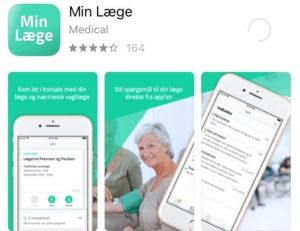News
Danes gain easy access to GPs via new app
This article is more than 6 years old.
The ‘Min Læge’ app is part of the government’s new digital health strategy

A new dawn for patients and GPs alike (photo: Health Ministry)
We’ve all been there, trying to get hold of our GP early in the morning.
“You are in line as number … 31,” the automated voice states before some dreadful panpipe version of ‘The Girl from Ipanema’ makes its ill-advised return.
Sometimes, there simply is no GP. Call one of these numbers for other doctors, they advise.
Doctor’s on call
But all that malarkey might be just an annoying memory, thanks to a new government-sanctioned app, ‘Min Læge’ (‘My Doctor’), which provides patients with direct access to their doctors via their mobile phones.
“The Danes are among the most digital in the world: we book hotels and hair appointments, pay bills and read our tax returns on the mobile phone, and we are more that adept at shopping online,” said the health minister, Ellen Trane Nørby.
“750,000 Danes have already downloaded the ’Medicinkortet’ app, which gives citizens an overview of their prescription medicine. The ‘Min Læge’ app makes contact with GPs more mobile, and that benefits the patient and the doctor.”
READ MORE: New citizen digital platform in the pipeline – with an app
Digital doctoring
Over the past week, thousands of Danes have already obtained the free app, which permits the user to see information such as their health info, GP opening hours, future appointments and vaccinations.
The app stems from the government’s digital health strategy that was presented in 2018, which aims to enhance co-operation across the health sector through digital technology and data.
The ‘Min Læge’ app is currently in its initial version, but it is expected to be further updated over the course of 2019. It can be downloaded from App Store and Google Play and can be used by nearly everyone – only 21 clinics are currently not on the app.
The first time you open the app you will be prompted to give permission so that your information can be sent from the GP’s IT system. You can delete your permission later on should you decide to no longer use the app.










































